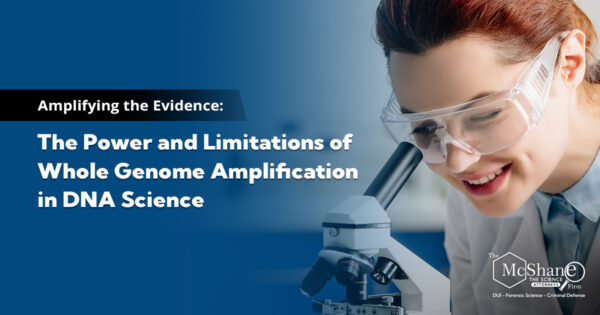Whole genome amplification (WGA) is a technique used in DNA science to amplify very small DNA samples. It allows forensic scientists to extract and amplify DNA from samples that are too small to be analyzed using traditional methods. In this blog post, we will explore what WGA is, its limitations, and how it is being used in the courtroom.

WGA works by creating multiple copies of the entire genome, which allows forensic scientists to analyze and create DNA profiles from very small or degraded samples. This technique has become increasingly important in forensic science, as it allows investigators to analyze samples that were previously too small or degraded to provide reliable results. It can be especially useful in cold cases, where DNA samples may have degraded over time, or in cases where the sample size is limited.
However, WGA has several limitations that must be taken into account. One of the main limitations of WGA is that it can introduce errors into the DNA profile. Because WGA relies on the amplification of very small amounts of DNA, it can sometimes introduce errors into the profile. This can lead to false positives or negatives, which can have serious consequences in criminal investigations and courtroom proceedings.
Another limitation of WGA is the potential for contamination. Because WGA relies on the amplification of very small amounts of DNA, it is especially vulnerable to contamination from other sources. This can lead to the creation of false DNA profiles, which can lead to false accusations or wrongful convictions.
Despite these limitations, WGA has been used in some criminal investigations and courtroom proceedings. For example, in the case of People v. Larry Swearingen, WGA was used to analyze DNA samples recovered from the victim’s fingernails. The results of the analysis were used to link the defendant to the crime, and he was subsequently convicted and sentenced to death.
However, the use of WGA in this case was challenged by the defense, who argued that the technique was unreliable and prone to error. Is it generally accepted in the scientific community? That is a challenging question.
In conclusion, WGA is a powerful tool in DNA science that allows forensic scientists to amplify very small or degraded DNA samples. While it has limitations, it has been used in some criminal investigations and courtroom proceedings to provide important evidence. However, the use of WGA has also been challenged in some cases, highlighting the need for caution and care in the use of this technique in forensic science and criminal investigations. As technology continues to advance, it is likely that new techniques and approaches will be developed to address these limitations and to ensure that DNA evidence is used effectively and accurately in criminal investigations and courtroom proceedings.


